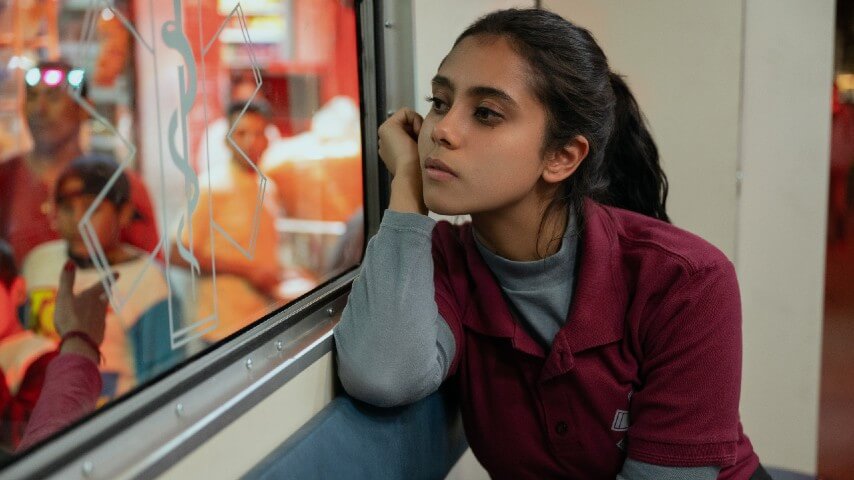Medical melodrama Midnight Family centers on a Mexican Meredith Grey
Apple TV+’s Spanish-language series follows a family ambulance business in Mexico City
Renata Vaca in Midnight Family (Photo: Apple TV+)
A true-to-form medical drama, Apple TV’s Midnight Family (Familia De Medianoche in Spanish) offers an intriguing window into Mexico City. In the show’s opening episode, the series claims that there are just “a little over 100” government ambulances to cover the capital’s nearly ten million residents. And filling in that huge gap are for-profit paramedics, like the fictional ones in the Tamayo family depicted here.
In the Spanish-language series, which was inspired by the 2019 documentary of the same name, Ramón Tamayo (Joaquín Cosío), his grown son Marcus (Diego Calva), daughter Marigaby (Renata Vaca), and young son Julito (Sergio “Keko” Bautista) cruise the city at night as a private ambulance business, answering dispatches and providing emergency care. But after delivering their patients to a hospital, they must awkwardly try to get paid for their services, muddying the purity of their work.
Midnight Family gives each of the Tamayos their own plots but Marigaby is at the show’s center. She’s a Mexican Meredith Grey, a rule-breaking medical student who, between saving lives, works her way to the top of a love triangle. Medicine is in her blood but her family, despite their heroism, is on the bottom rung of the system, often mocked by the type of well-to-do doctors portrayed on Grey’s Anatomy.
Straddling this divide, Marigaby’s journey takes us across the city’s class system, from spoiled rich kids to hard-working folks, giving us a vision of Mexico’s capital that some gringos may be unfamiliar with. There’s no sepia tone here, and the city is painted as a modern metropolis with all of the joys and problems that go with it. Midnight Family also, consequently, sheds light on a few families outside of the Tamayos, including immigrant ones hailing from the likes of Colombia and Spain.
This show offers the type of life-or-death stakes that fans of the genre should appreciate, pairing them with Marigaby’s romantic adventures and leading us from one rush to the next. The series does an excellent job of setting up her entanglements, and it’s clear why she likes both of her gentlemen callers, as their sexual chemistries are palpable. And Midnight Family has fun with her indecision, giving her the type of love story Meredith fantasizes about. But unlike in Grey’s, there’s no clear winner for Marigaby, which makes the whole dynamic more fun.
To be fair, all the love stories in the show don’t fare as well. Marcus’ relationship with Cris (Mariana Gómez) gets stuck early on. The couple has a big decision to make, which they face by having the same conversation over and over again. It may be realistic but it makes for boring TV. And their rehashing of that issue is indicative of the series’ larger problem of uneven pacing. The first two episodes are slow, giving the sense that being a paramedic involves a lot of waiting around. Again, that may be true but it doesn’t result in compelling television.
Luckily, the third episode takes off as the show dramatizes the 2017 earthquake that killed 370 people and injured more than six thousand. When the critically hurt Nallely (Roma’s Yalitza Aparicio) arrives, Midnight Family hits its stride and is better able to manage its elements now that it’s situated itself in a clear (and clearly high-stakes) moment and place.
The series humanizes these stories with some great performances. As Marigaby, Renata Vaca is wonderful, strong, and vulnerable, with a simmering confidence and righteousness that grows as the season goes on. And Joaquín Cosío as patriarch Ramón is perfectly cast as a man losing his place in society and beset by health problems. His excellence as a paramedic may have brought him professional admiration but it hasn’t earned him economic security or the family life he envisioned. (Fans of Gentefied are already familiar with his ability to charm as a lovable, grumpy old guy who has to learn to ask for help.)
Meanwhile, Sergio “Keko” Bautista as Marigaby’s young brother Julito is surprisingly delightful. It can be hard to find the right balance for a child character in an ensemble of adults. Plot-wise, they’re often infantilized, and sometimes performers can’t quite rise to the grown-up-themes of the material. Midnight Family handles it just right though. Julito is clearly a kid, but the show doesn’t make light of his problems. Bautista knows when to lean hilariously into childish impatience, when to get swept away in the moment, and when to delve into his character’s more complex emotions. After the nocturnal horrors of the family business, he’s the palette cleanser this show occasionally needs.
It all combines to make a strong—albeit imperfect—medical drama. The first season could be tighter across its ten hourlong episodes, particularly as it ends on a cliffhanger. And as a melodrama, it plays with the audience’s emotions accordingly. Sometimes that works, while other times it feels manipulative or—worse yet—predictable. But Midnight Family has more going for it than not, with a captivating family we’d happily stick with for another season.
Midnight Family premieres September 25 on Apple TV+